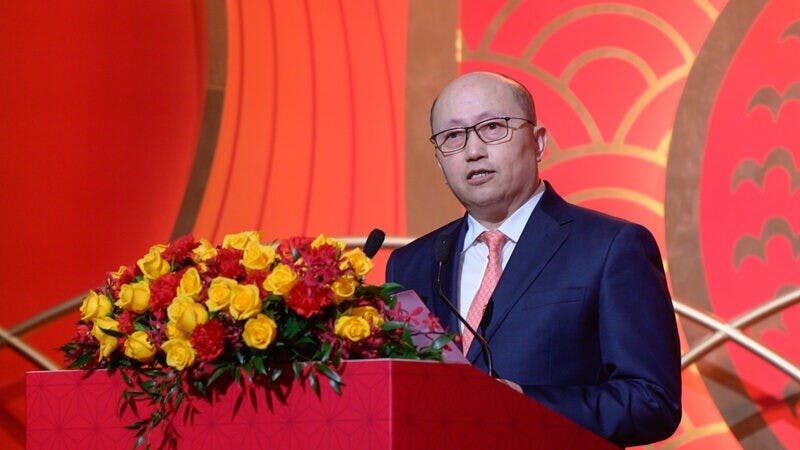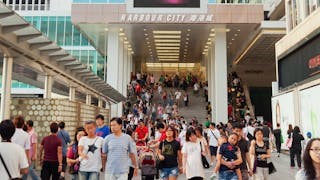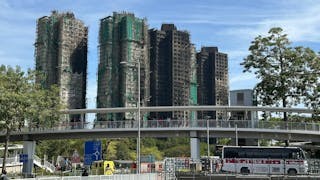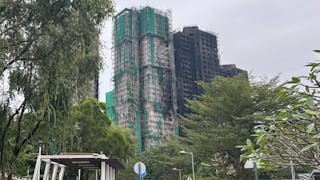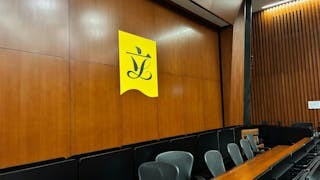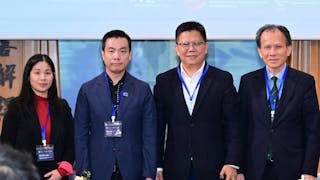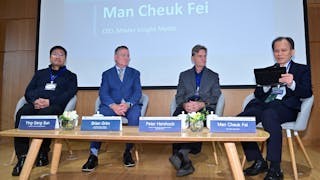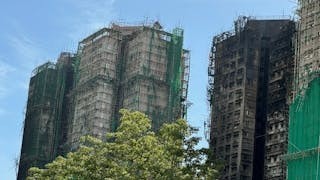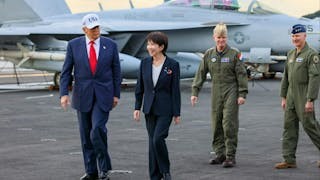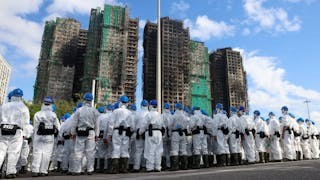香港中聯辦主任鄭雁雄和澳門中聯辦主任鄭新聰,分別於2024年1月30日和2月1日在香港和澳門特別行政區中聯辦新春招待會上致辭。本文檢視他們的演講內容,並討論期望香港和澳門特區政府改進的地方。
鄭雁雄致辭強調香港優勢
鄭雁雄的演講首先談到了2023年,這標誌着貫徹和落實中共二十大精神的開端,習近平以全票當選國家主席和中央軍委主席。鄭雁雄強調中國「神舟」飛船和中國經濟的成就、第三屆一帶一路國際論壇在北京舉行並取得巨大成功。鄭雁雄說,杭州亞運會是另一個亮點,展現了中國式現代化的成功與自信。
鄭雁雄接着談及2023年香港的發展,表示習近平主席給培僑中學學生的回信,為香港注入了強大的青春力量,意味着中國自信而強大的領導,為李家超政府提供了必要的支持,在新冠疫情結束後帶來了經濟活力,並告別了香港的社會政治混亂。鄭雁雄表示,香港透過區議會順利換屆、落實「愛國者治港」,告別了「政治泛化迷思」;過百項大灣區標準落地、一大批企業人才來港、一系列民生舉措出台。
鄭雁雄的致辭強調,香港背靠祖國、聯通世界的優勢獨一無二。新的一年,香港應圍繞對接國家發展戰略和廣泛開展國際合作;多一分信心,少一分因循守舊;多一分改革創新,多一分積極力量,少一分「怪話謬論」。
他明確要求港人應不斷適應與祖國的融合,積極思考、積極行動,避免不必要的爭論。
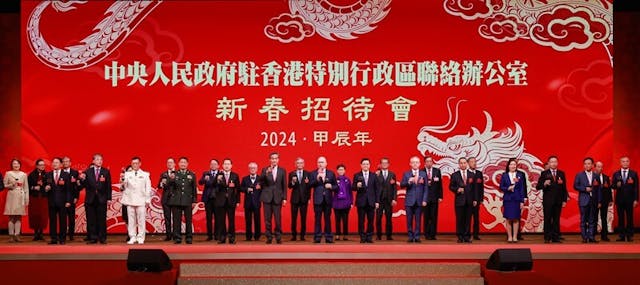
隨後他轉而呼籲香港辦好涉及國家安全的「重大案件」,完成《基本法》23條本地立法,因為發展與安全是「車之兩輪、鳥之兩翼」;國泰民安才能各得其所、百業興旺,香港人就能安居樂業、繁榮發展。因此,香港人必須遵守法律,保持香港的活力和多樣性,讓創業者有夢可追,讓打工者有事可做,讓投資者有利可圖,香港必定能迸發東方之珠的新魅力。
鄭雁雄說,在從「由治及興」轉變的過程中,香港可以彰顯獅子山精神,文化是社會和諧社團結的最好粘合劑。港人需要堅定歷史自信和歷史主動性,肩負起國家發展的重任。以身為龍的傳人為榮,大力弘揚以愛國愛港為核心的價值觀,致力將香港打造成擁有國際創科中心和中外文化藝術交流中心的文化名城。
鄭雁雄在致辭中暗示,香港在未來幾年應利用港產電影、流行歌曲和武俠小説曾經輝煌的歷史文化遺產,進一步發展文化產業。
最後,鄭雁雄呼籲香港各族群進一步建設香港,提升治理水平,推動經濟發展,排解民生憂難,他說,中聯辦是堅定不移貫徹一國兩制方針、全力支持李家超和特區政府依法施政的「超級聯絡員」。
鄭新聰致辭彰顯粵澳合作
無獨有偶,澳門中聯辦主任鄭新聰致辭時,一開始同樣強調了2023年中國的成功發展,而中共二十大是展現中國經濟復甦的重頭戲。與鄭雁雄一樣,鄭新聰強調了中國在各方面的成就,包括高品質發展、國家在新能源汽車和可持續發展方面的創新能力、綠色發展、亞運會的成功、中國與中亞國家的峰會、共建一帶一路高峰會的召開,中國外交廣交國際朋友、建構「人類命運共同體」的巨大成功。
鄭新聰隨後將時間轉回2023年,這是澳門見證經濟復甦、發展和國家安全的一年。澳門修訂了國家安全法,澳門選舉制度進一步完善,經濟復甦按下「快進鍵」;橫琴粵澳深度合作區發展取得新進展,文化體育事業再上台階,民生福祉不斷改善。甘肅、青海發生地震災害後,澳門各界踴躍捐款捐物援助災區,充分彰顯澳門人守望相助的同胞情懷。
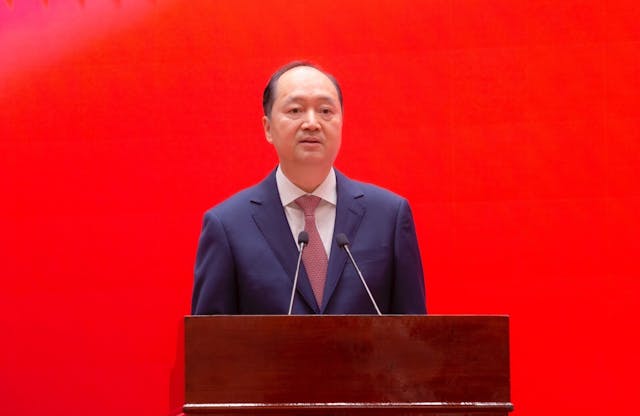
鄭新聰還說,澳門科學一號衛星成功發射後,習近平主席向澳門科技大學師生寫信勉勵。習主席也讚揚了澳門行政長官賀一誠的工作。鄭新聰說,在中華民族偉大復興的進程中,澳門的角色和優勢一定會充分發揮。
與鄭雁雄一樣,鄭新聰也強調要保障國家安全,沒有國家安全就不可能發展,更談不上民生。這位中聯辦主任提醒澳門,以解決問題的決心加速推動澳門經濟適度多元,實現高品質發展。
鄭新聰致辭的最後一段,敦促澳門要要加快推進經濟適度多元,充分發揮澳門獨特地位和優勢,積極參與粵港澳大灣區建設、一帶一路建設高品質發展,大力推進橫琴合作區建設,提升經濟韌性和可持續發展能力,增加澳門人的幸福感和安全感。
相較而言,鄭雁雄致辭的政治正確性比鄭新聰還要強烈得多,前者對國家發展的盛讚程度相當突出。
指出港澳不足 呼籲改善管治
有意思的是,兩人都指出了香港和澳門的不足之處。鄭雁雄呼籲香港民眾多思考如何發展香港文化產業,改變保守、維持現狀的思維;鄭新聰要求澳門各界加速與橫琴地區融合進程,促進經濟多元化。兩人都期望香港和澳門政府能增強自信和施政能力。
事實上,習近平主席在中共二十大關於港澳的講話中,就提到了要提升管治水平。1月31日開始了為期一個月的《基本法》第23條立法諮詢期,鄭雁雄在致辭時提到《基本法》第23條立法也就可以理解了。鑑於香港政治和「愛國」氛圍的快速轉變,市民大眾必然會支持第23條立法。
然而,香港的管治水準仍有待提高。最近提出對垃圾徵費的建議是一種影響所有香港市民的稅收,這一建議引發了公眾的擔憂和批評,特別是基層市民將受到垃圾徵費的影響。政府已將垃圾收費從4月推遲到8月實施,但需要更多的公眾討論和更全面的政府規劃。
香港管治的另一短板是公營房屋單位的供應和輪候時間。供應量的確增加了,但仍無法滿足龐大的需求,而且等待時間仍然較長。
若然民生是中央政府關心香港的問題,那麼香港特區政府就必須採取更多措施解決民生問題,包括垃圾徵費、公屋供應不足及輪候時間長等問題。目前,政府的首要任務是在讓立法會通過《基本法》第23條,可以理解,這只是時間問題,注意力不應被其他民生問題分散。
對於香港文化產業的發展,鄭雁雄並沒有給出具體的解決方案,而是留給了文化專業人士。鑑於香港已推行愛國主義、歷史和國民教育,新的歷史博物館建設可以輕易激發深厚的中華文化和歷史遺產,從而沿着澳門已經採取和實施的路線發展文化歷史旅遊。香港旅遊部門也未能充分認識香港的歷史文化遺址,許多戰時遺址缺乏翻新、修繕和宣傳工作。
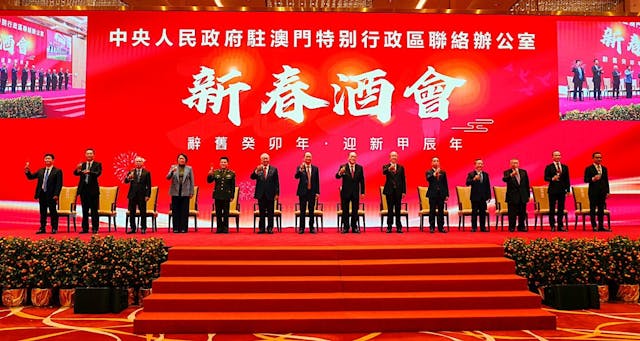
澳門經濟適度多元化任重道遠
在澳門,政府對經濟多元化的處理或許也是中聯辦主任鄭新聰的關鍵政績指標之一,這方面還需要做更多的工作。除了要宣傳橫琴粵澳深度合作區的各類官方文件和相關政策措施外,還要鼓勵甚至動員更多的澳門民眾到橫琴旅遊,加快合作區的建設和發展。澳門與珠海處理横琴合作區事務的聯合委員會最好定期發表易於大眾傳媒取得的報告,以便澳門公眾定期、快速地了解合作區的發展。
事實上,澳門的管治水準需要進一步提高。公共工程項目的時間表需要更加公開地闡明,以便能夠按期完成。 在沒有明確具體時間表的情況下,合作區的發展不可能輕易加速。未來幾年,澳門的管治必須展現出更強有力的政府領導和協調。
綜上所述,鄭雁雄和鄭新聰的致辭有顯著的相同點和不同點。兩人的相似之處包括高度的政治正確、強調中國對香港和澳門發展和融合的優勢及提升地方管治水平的需要。不同內容體現在強調香港施政和適應需要新思維、發展香港文化產業、加速與橫琴融合進程的必要性等。雖然即將出台的《基本法》第23條立法肯定會獲得立法會通過,但其他民生政策,特別是公營房屋,甚至垃圾收費,應該以更果斷和有效的方式來管理。就澳門而言,澳門政府需要與珠海就横琴合作區的發展進行更多溝通和更密切的合作,同時加強澳門社會的宣傳工作,以及讓澳門和珠海横琴合作區各項發展項目的時間表更加明確。
A Comparative Analysis of Remarks of Liaison Office Directors on Hong Kong and Macau
The Liaison Office Directors of Hong Kong and Macau, Zheng Yanxiong and Zheng Xincong, delivered their speeches for the Hong Kong and Macau special administrative regions for the forthcoming Chinese New Year in 2024, on January 30 and February 1, respectively. This article examines the content of their speeches and discusses the areas of improvement expected for the governments of Hong Kong and Macau.
Zheng Yanxiong’s speech began with a statement on the year 2023, which marked an inception of the implementation of the spirit of China’s 20th Party Congress, where Xi Jinping was re-elected with full votes as not only the president but also the chair of the central military commission. Zheng stressed the achievements of the Chinese spaceship Shenzhou and of the Chinese economy, while the third international forum of the Belt and Road Initiatives was held in Beijing with tremendous success. The Asian Games in Hangzhou was another highlight, demonstrating the success and self-confidence of the Chinese style of modernization, according to Zheng.
Zheng then shifted to the development of Hong Kong in 2023, saying that President Xi responded to the letter of Hong Kong students from the Pui Kiu Secondary School and that he injected a strong and youthful element to Hong Kong. This meant that China’s assertive and strong leadership provided he necessary support to the John Lee administration, which brought about economic vitality after the end of Covid-19 and its variants, and which bid farewell to the socio-political chaos in Hong Kong. Zheng said that Hong Kong bade farewell to “the puzzling thought of hyperpoliticization” through the completion of the District Council elections and the realization of the “patriots” ruling Hong Kong. Over one hundred items related to the development of the Greater Bay Area were implemented, including other measures stimulating the people’s livelihood and the migration of a large batch of talents to Hong Kong.
Zheng’s speech emphasized how Hong Kong has been benefiting from its strong motherland, China, and he added that Hong Kong should persist in developing international contacts and implementing the national plan with more confidence, less pro-status quo and conservative mindset, more assertive energies and less “ridiculous theories.”
He clearly asks the people of Hong Kong to keep adapting to its integration with the motherland, to think proactively, to act assertively and to avoid unnecessary arguments.
He then shifted to the appeal to Hong Kong to deal with the “important cases” concerning national security and to complete the legislation on Article 23 of the Basic Law, because development and security are two sides of the same coin. With national security entrenched, the people of Hong Kong can have their safe residence and prosperous development. As such, the Hong Kong people must abide by the law, protect the city’s vitality and diversity so that people can innovate their business, workers can continue with their jobs, investors can earn money from their investment, and then Hong Kong will be able to expand its glamor and glitter.
According to Zheng, in the process of transforming the process from “governance to prosperity,” Hong Kong can develop its “lion rock spirit,” attach importance to social harmony and group cohesion, maintain the people’s historical self-confidence and activeness, shoulder the honour of becoming the descendants of the dragon, develop forcefully the patriotic attitude toward Hong Kong, and seek to shape the city as a cultural city with arts and cultural exchange, international innovative ability, and cultural enterprises.
What Zheng implied in his speech was that Hong Kong should develop its cultural industry further in the coming years by utilizing its cultural historical heritage where the film industry, pop songs and fictional works had their glorious years in the past.
Finally, Zheng appealed to all the ethnic groups in Hong Kong to build up the city further, elevating the standards of governance, promoting economic development, and solving the problems in the people’s livelihood and their worries. The Liaison Office, according to Zheng, is a “super-liaison officer” resolutely implementing the “one country, two systems” and fully supporting the John Lee government.
Coincidentally, the speech delivered by Zheng Xincong on Macau began with an equally strong emphasis on China’s successful development in the year 2023, during which the 20th Party Congress was a main event showing the recovery of the Chinese economy. As with Zheng Yanxiong, Zheng Xincong emphasized China’s achievements in various aspects, including its high-quality development, national innovative ability in new energy vehicles and sustainability, green development, the success in Asian Games, the summit between China and Central Asian countries, the holding of the Summit of the Belt and Road Initiatives, and the great success of China’s diplomacy through making more international friends and through the construction of the “common destiny for the humankind.”
Zheng Xincong then shifted to the year 2023 as one in which Macau witnessed economic recovery, development, and national security. The national security law of Macau was amended, while national security could achieve social and national cohesion. The Macau electoral system was improved; the Hengqin-Guangdong-Macau In-Depth Cooperation Zone had its policy measures being implemented. Macau’s unemployment rate was low, its minimum wage was raised and adjusted; housing policies were implemented; and the Island Hospital went into operation. The Macau people donated money to the victims of the earthquake in Gansu province, showing the vitality and advantages of Macau’s “one country, two systems.”
Zheng added that President Xi wrote a letter to the teachers and students at the Macau University of Science and Technology in their efforts at studying the development of the Chinese satellite. President Xi also praised the work of Macau chief executive Ho Iat Seng. In the process of China’s national renaissance, the role and advantages of Macau can and will be fully utilized, Zheng said.
As with Zheng Yanxiong, Zheng Xincong laid their emphasis on the need for the protection of national security without which development would be impossible, let alone the people’s livelihood. The Macau Liaison Office Director alerted Macau to accelerate the promotion of Macau’s suitable economic diversification with the determination of dealing with problems so that the city will have high-quality development.
The last paragraph of Zheng Xincong’s speech urged Macau to accelerate the promotion of economic diversification, to actively converge with what the Chinese nation needs, to fully develop Macau’s advantages, to develop high-quality development in the Belt and Road Initiatives, to forcefully promote the construction of the Hengqin-Guangdong-Macau deep cooperation, and to elevate the sense of wellbeing and safety of the people of Macau.
Comparatively speaking, Zheng Yanxiong’s speech attached to political correctness in a way even much stronger than Zheng Xincong. The former heaped praise on the motherland’s development to an extent that was quite prominent.
Most interestingly, both pointed to the inadequacies of Hong Kong and Macau. Zheng Yanxiong appealed to the people of Hong Kong to pay more thoughts on how to develop Hong Kong’s cultural industry, and to change their conservative and pro-status quo thinking. Zheng Xincong asked the people of Macau to accelerate the process of integrating with the Hengqin area and promoting economic diversification. Both also expected the governments of Hong Kong and Macau to develop their self-confidence and governing capability.
In fact, the need to improve the standards of governance was mentioned by President Xi Jinping in his speech that covered Hong Kong and Macau during the 20th Party Congress. With the inception of a one-month consultative period on the content of Article 23 of the Basic Law on January 31, it was understandable why Zheng Yanxiong in his speech had mentioned the legislation on Article 23. Given the rapidly changing political and “patriotic” atmosphere in Hong Kong, the members of the public must support the legislation on Article 23.
However, the standards of governance in Hong Kong remains to be improved. A recent proposal of levying a charge on rubbish waste is a kind of tax affecting all citizens of Hong Kong – a proposal that sparked public concerns and criticisms, especially as the lower-class citizens will be affected by such a rubbish tax. The government has postponed the implementation of waste charges from April to August, but more public discussion and more comprehensive governmental planning are necessary.
Another gap in the governance of Hong Kong is the provision and waiting time of public housing units. The provision has increased, but it still falls short of the huge demand, while the waiting time remains quite long.
If the people’s livelihood is a matter of central government’s concern about Hong Kong, the Hong Kong ruling authorities must do more to tackle such livelihood issues, including even rubbish levy and the inadequate provision and the long waiting time of public housing units. Currently, it is understandable that the governmental priority is focusing on the passage of Article 23 of the Basic Law in the Legislative Council – a matter of time that should not distract its attention from other livelihood issues.
On the development of Hong Kong’s cultural industries, Zheng Yanxiong did not specify the concrete solutions but left them to the cultural professionals. Given the fact that Hong Kong has implemented patriotic, history and national education, the construction of new historical museums can easily galvanize on the strong Chinese cultural and historical heritage so that cultural-historical tourism will be developed along the line that has been adopted and implemented well in Macau. Hong Kong’s tourism authorities have also failed to appreciate the historical and cultural sites in the city, with many of these sites during wartime lacking renovation, repair, and publicity work.
In Macau, the government’s handling of economic diversification is perhaps also one of the key performance indicators of the Liaison Office Director Zheng Xincong. More work needs to be done. Apart from the need to publicize all kinds of official documents and related policy measures on the Hengqin-Guangdong-Macau In-Depth Cooperation Zone, more Macau people must be encouraged and even mobilized to visit Hengqin so that the cooperation zone will have its construction and development accelerated. The joint committee between Macau and Zhuhai in dealing with the zone should ideally issue regular reports easily accessible to the mass media so that the members of the Macau public know the zone’s development regularly and rapidly.
Indeed, the standards of governance in Macau need to improve further. The timeline of public work projects needs to be spelt out more openly so that they can and will be completed on schedule. Without concrete timeline being specified, the cooperation zone’s development cannot be easily accelerated. Stronger governmental leadership and coordination will have to be demonstrated in Macau’s governance in the coming years.
In conclusion, the speeches delivered by Zheng Yanxiong and Zheng Xincong had significant similarities and differences. Their similarities embraced a high degree of political correctness, the emphasis on China’s advantages to the development and integration of both Hong Kong and Macau, and the need for elevating the standards of local governance. Their different content was shown in the emphases on the need for new thinking in the governance and adaptation of Hong Kong, the need to develop the cultural industry in Hong Kong, and the necessity of accelerating the process of integrating with Hengqin. While the forthcoming legislation on Article 23 of the Basic law will certainly be approved by the Legislative Council, other livelihood-related policies, notably public housing and even the rubbish waste charges, can and should be managed in a more assertive and effective manner. In the case of Macau, its government needs to work more communicatively and closely with Zhuhai on the development of the cooperation zone, accompanied by much better publicity work in the Macau community and by much clearer timelines of various developmental projects in both Macau and the cooperation zone.
原刊於澳門新聞通訊社(MNA)網站,本社獲作者授權轉載。原文網址:http://tinyurl.com/3setyvzc



